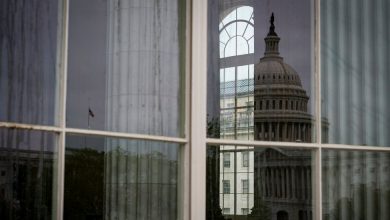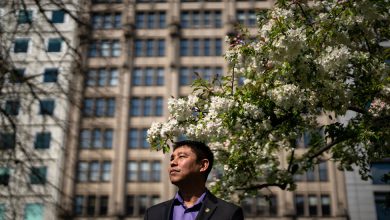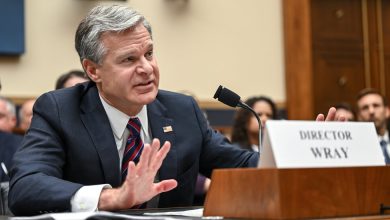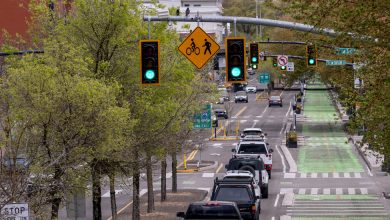Trump’s Team of Lawyers Marked by Infighting and Possible Legal Troubles of Its Own
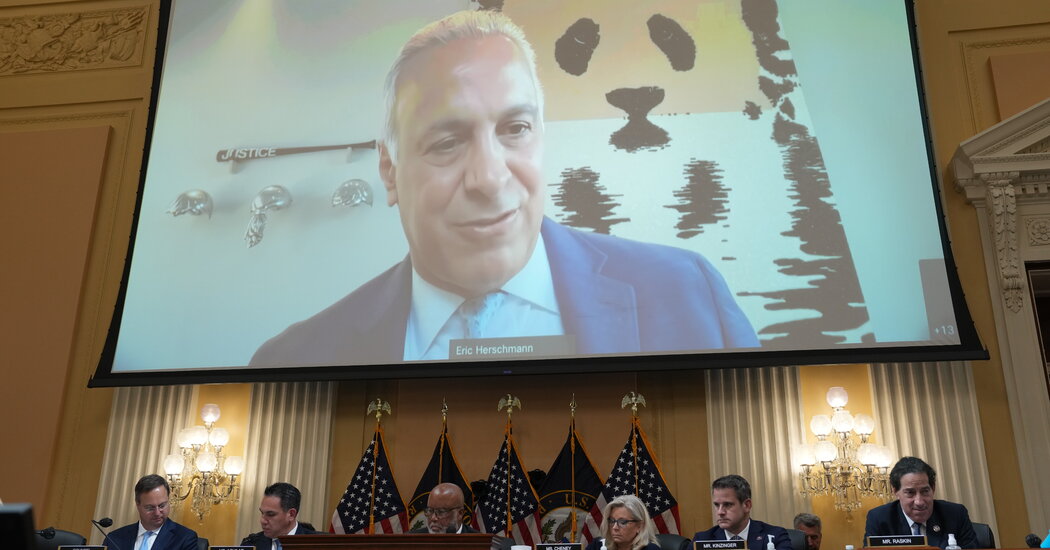
To understand the pressures, feuds and questions about competence within former President Donald J. Trump’s legal team as he faces potential prosecution on multiple fronts, consider the experience of Eric Herschmann, a former Trump White House lawyer who has been summoned to testify to a federal grand jury.
For weeks this summer, Mr. Herschmann tried to get specific guidance from Mr. Trump’s current lawyers on how to handle questions from prosecutors that raise issues of executive privilege or attorney-client privilege.
After ignoring Mr. Herschmann or giving him what he seemed to consider perplexing answers to the requests for weeks, two of the former president’s lawyers, M. Evan Corcoran and John Rowley, offered him only broad instructions in late August. Assert sweeping claims of executive privilege, they advised him, after Mr. Corcoran had suggested that an unspecified “chief judge” would ultimately validate their belief that a president’s powers extend far beyond their time in office.
Mr. Herschmann, who served on Mr. Trump’s first impeachment defense team but later opposed efforts to reverse the results of the 2020 election, was hardly reassured and sounded confused by the reference to a chief judge.
“I will not rely on your say-so that privileges apply here and be put in the middle of a privilege fight between D.O.J. and President Trump,” Mr. Herschmann, a former prosecutor, responded in an email, referring to the Justice Department. The exchange was part of a string of correspondence in which, after having his questions ignored or having the lawyers try to speak directly with him on the phone instead, Mr. Herschmann questioned the competence of the lawyers involved.
The emails were obtained by The New York Times from a person who was not on the thread of correspondence. Mr. Herschmann declined to comment.
Mr. Herschmann’s opinion was hardly the only expression of skepticism from current and former allies of Mr. Trump who are now worried about a turnstile roster of lawyers representing a client who often defies advice and inserts political rants into legal filings.
Mr. Trump’s legal team just won one round in its battle with the Justice Department over the seizure of documents from his residence and private club in Florida, Mar-a-Lago, and it is not clear whether he will face prosecution from the multiple federal and state investigations swirling around him even as he weighs another run for the presidency.
Mr. Trump has also just brought on a well-regarded lawyer, Christopher M. Kise, the former solicitor general of Florida, to help lead his legal team, after being rejected by a handful of others he had sought out, including former U.S. attorneys with experience in the jurisdictions where the investigations are unfolding.
Mr. Kise agreed to work for the former president for a $3 million fee, an unusually high retainer for Mr. Trump to agree to, according to two people familiar with the figure. Mr. Kise did not respond to an email seeking comment.
What to Know About the Trump Investigations
Numerous inquiries. Since former President Donald J. Trump left office, he has been facing several civil and criminal investigations into his business dealings and political activities. Here is a look at some notable cases:
Classified documents inquiry. The F.B.I. searched Mr. Trump’s Florida home as part of the Justice Department’s investigation into his handling of classified materials. The inquiry is focused on documents that Mr. Trump had brought with him to Mar-a-Lago, his private club and residence, when he left the White House.
Jan. 6 investigations. In a series of public hearings, the House select committee investigating the Jan. 6 attack laid out a comprehensive narrative of Mr. Trump’s efforts to overturn the 2020 election. This evidence could allow federal prosecutors, who are conducting a parallel criminal investigation, to indict Mr. Trump.
Georgia election interference case. Fani T. Willis, the Atlanta-area district attorney, has been leading a wide-ranging criminal investigation into the efforts of Mr. Trump and his allies to overturn his 2020 election loss in Georgia. This case could pose the most immediate legal peril for the former president and his associates.
New York State civil inquiry. Letitia James, the New York attorney general, has been conducting a civil investigation into Mr. Trump and his family business. The case is focused on whether Mr. Trump’s statements about the value of his assets were part of a pattern of fraud or were simply Trumpian showmanship.
Manhattan criminal case. Alvin L. Bragg, the Manhattan district attorney, has been investigating whether Mr. Trump or his family business intentionally submitted false property values to potential lenders. But the inquiry faded from view after signs emerged suggesting that Mr. Trump was unlikely to be indicted.
But Mr. Trump’s legal team has been distinguished in recent months mostly by infighting and the legal problems that some of its members appear to have gotten themselves into in the course of defending him.
In a statement, a spokesman for Mr. Trump, Taylor Budowich, said that “the unprecedented and unnecessary weaponization of law enforcement against the Democrats’ most powerful political opponent is a truth that cannot be overshadowed and will continue to be underscored by the vital work being done right now by President Trump and his legal team.”
Two members of the Trump legal team working on the documents case, Mr. Corcoran and Christina Bobb, have subjected themselves to scrutiny by federal law enforcement officials over assurances they provided to prosecutors and federal agents in June that the former president had returned all sensitive government documents kept in his residence and subpoenaed by a grand jury, according to people familiar with the situation.
That assertion was proved to be untrue after the search of Mar-a-Lago in August turned up more than 100 additional documents with classification markings.
Investigators are seeking information from Ms. Bobb about why she signed a statement attesting to full compliance with the subpoena, and they have signaled they have not ruled out pursuing a criminal inquiry into the actions of either Ms. Bobb or Mr. Corcoran, according to two people briefed on the matter.
The attestation was drafted by Mr. Corcoran, but Ms. Bobb added language to it to make it less ironclad a declaration before signing it, according to the people. She has retained the longtime criminal defense lawyer John Lauro, who declined to comment on the investigation.
It is unclear whether the authorities have questioned Ms. Bobb yet or whether she has had discussions with Mr. Trump’s other lawyers about the degree to which she would remain bound by attorney-client privilege.
Mr. Corcoran and Mr. Rowley did not respond to emails seeking comment.
Mr. Corcoran, a former federal prosecutor and insurance lawyer, represented the former Trump aide Stephen K. Bannon in his recent trial for refusing to comply with a subpoena issued by the House committee investigating the Jan. 6 attack on the Capitol. In that case, Mr. Bannon claimed he believed he had immunity from testimony because of executive privilege; Mr. Trump later said he would not seek to invoke executive privilege for Mr. Bannon.
Mr. Corcoran, the son of a former Republican congressman from Illinois, has told associates that he is the former president’s “main” lawyer and has insisted to colleagues that he does not need to retain his own counsel, as Ms. Bobb has.
But several Trump associates have said privately that they believe Mr. Corcoran cannot continue in his role on the documents investigation. That view is shared by some of Mr. Trump’s advisers, who have suggested Mr. Corcoran needs to step away, in part because of his own potential legal exposure and in part because he has had little experience with criminal defense work beyond his stint as a federal prosecutor for the U.S. attorney in Washington more than two decades ago.
Mr. Trump has at least 10 lawyers working on the main investigations he faces. Mr. Corcoran, Ms. Bobb and Mr. Kise are focused on the documents case, along with James M. Trusty, a former senior Justice Department official. Three lawyers on the team — Mr. Corcoran, Mr. Rowley and Timothy Parlatore — represent other clients who are witnesses in cases related to Mr. Trump’s efforts to stay in power.
To the extent anyone is regarded as a quarterback of the documents and Jan. 6-related legal teams, it is Boris Epshteyn, a former campaign adviser and a graduate of the Georgetown University law school. Some aides tried to block his calls to Mr. Trump in 2020, according to former White House officials, but Mr. Epshteyn now works as an in-house counsel to Mr. Trump and speaks with him several times a day.
Mr. Epshteyn played a key role coordinating efforts by a group of lawyers for and political allies of Mr. Trump immediately after the 2020 election to prevent Joseph R. Biden Jr. from becoming president. Because of that role, he has been asked to testify in the state investigation in Georgia into the efforts to reverse Mr. Biden’s victory there.
Mr. Epshteyn’s phone was seized by the F.B.I. last week as part of the broad federal criminal inquiry into the attempts to overturn the election results and the Jan. 6 assault on the Capitol. That prompted alarm among some of Mr. Trump’s allies and advisers about him remaining in a position of authority on the legal team.
It is not clear how much strategic direction and leadership Mr. Kise may provide. But he is joining a team defined by warring camps and disputes over legal issues.
In his emails to Mr. Corcoran and Mr. Rowley, Mr. Herschmann — a prominent witness for the House select committee on Jan. 6 and what led to it — invoked Mr. Corcoran’s defense of Mr. Bannon and argued pointedly that case law about executive privilege did not reflect what Mr. Corcoran believed it did.
Mr. Herschmann made clear in the emails that absent a court order precluding a witness from answering questions on the basis of executive privilege, which he had repeatedly implored them to seek, he would be forced to testify.
“I certainly am not relying on any legal analysis from either of you or Boris who — to be clear — I think is an idiot,” Mr. Herschmann wrote in a different email. “When I questioned Boris’s legal experience to work on challenging a presidential election since he appeared to have none — challenges that resulted in multiple court failures — he boasted that he was ‘just having fun,’ while also taking selfies and posting pictures online of his escapades.”
Mr. Corcoran at one point sought to get on the phone with Mr. Herschmann to discuss his testimony, instead of simply sending the written directions, which alarmed Mr. Herschmann, given that Mr. Herschmann was a witness, the emails show.
In language that mirrored the federal statute against witness tampering, Mr. Herschmann told Mr. Corcoran that Mr. Epshteyn, himself under subpoena in Georgia, “should not in any way be involved in trying to influence, delay or prevent my testimony.”
“He is not in a position or qualified to opine on any of these issues,” Mr. Herschmann said.
Mr. Epshteyn declined to respond to a request for comment.
Nearly four weeks after Mr. Herschmann first asked for an instruction letter and for Mr. Trump’s lawyers to seek a court order invoking a privilege claim, the emails show that he received notification from the lawyers — in the early morning hours of the day he was scheduled to testify — that they had finally done as he asked.
His testimony was postponed.
Michael S. Schmidt contributed reporting.
Kitty Bennett contributed research.

